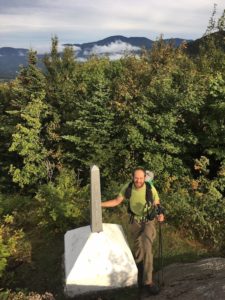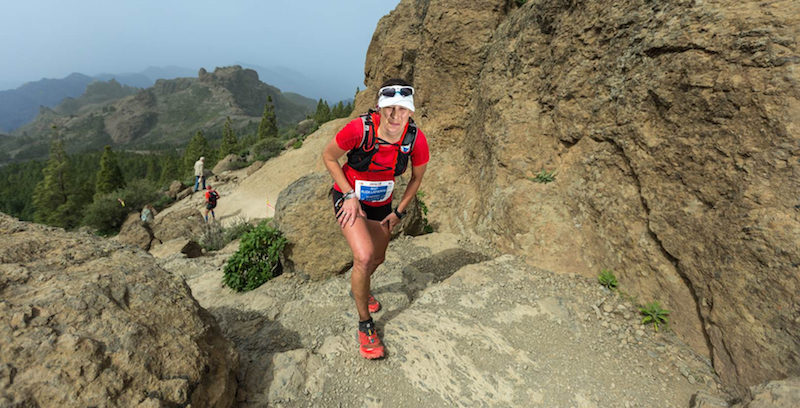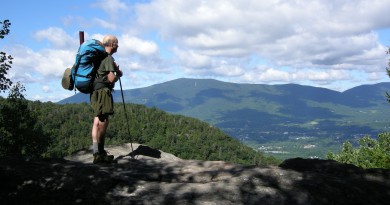Meet the Vermonters Taking on Fastest-Known-Times This Summer
Last year, Alyssa Godesky set a new supported fastest-known-time on the Long Trail. This year, two Vermonters aim to set new FKTS.
This summer, ultramarathoner Aliza LaPierre plans to make her first attempt at a fastest-known-time (supported) on her home turf by running Vermont’s 273-mile Long Trail.
Last July, professional triathlete Alyssa Godeskey, 33, of Charlottesville, Va. broke the women’s supported fastest-known-time for the Long Trail shattering Nikki Kimball’s longstanding record of five days, seven hours and 42 minutes. Godeskey ran the trail in five days, two hours and 37 minutes.
Williston’s LaPierre is now eyeing that record. “I was born and raised in Vermont and I take pride in that,” she says. “I often train on the Long Trail and I feel most myself when I’m running in the Green Mountains.”
LaPierre has been running ultramarathons on trails since 2004, when she tackled her first: the Vermont 50. She’s competed on the Ultra-Trail World Tour and was the second-fastest woman in her first 100-mile race in 2010. Though she’s never thru-hiked the Long Trail, she’s run some serious sections of it (like the 26-mile stretch between Camels Hump and the summit of Mt. Mansfield) and has been hiking it her whole life.
This summer, it looks like the timing will finally be right for her. “I’ve been dreaming of going after the FKT for years now. In all honesty, I haven’t tried it in the past because I’ve lacked the confidence,” says LaPierre, who has raced all over the world and tackled hundred plus mile races in Colorado’s Rocky Mountains, the Alps and beyond. “The overall length of the trail and the elevation gain and loss is manageable for me, but where the difficulty lies is in the terrain. Rocks, roots, mud and the straight up and down nature of it makes a lot of those miles laborious and slow-going.”
When asked why now, she said, “The trail’s not getting any easier and I’m not getting any younger.”
LaPierre plans to tackle Godesky’s supported record in June. She hasn’t yet made her FKT known online because she says those plans could change if she doesn’t get the weather window she needs. “Lining up a supported attempt means coordinating with other people’s schedules. If for some reason I’m not ready, I could miss that. If I have to delay, I’ll likely go unsupported.”
This, says LaPierre, will be especially challenging. “Every ounce counts and in Vermont, you have to carry certain gear to be prepared for weather,” says LaPierre, adding that balancing a minimal base pack weight with enough calories to fuel means runners in this category usually go without much food. If you are forced to borrow gear or bail to get gear, your unsupported attempt is disqualified. The same goes for accepting food. “You have to set a daily fueling plan and stick to it even if you are still hungry,” said LaPierre. “It’s literally you and the trail and you have to push yourself and at the same time regulate yourself. It becomes a very find line and once you cross that line, it can be hard to come back.”
Since 2018, those records have been compiled on the website fastestknowntime.com, where athletes compete for “FKTs” in three categories: unsupported, self-supported and supported. An unsupported FKT requires that a runner or hiker have no external support of any kind, requiring they carry everything they need from start to finish except for water. For a self-supported FKT, a runner may cache or purchase supplies along the way, but not receive any pre-arranged assistance. In a supported FKT attempt, a runner is met by a crew along the way which can range from a crew accompanying the runner the whole way to one person offering assistance one time over the course of the run.
AN UNSUPPORTED FKT
Currently, there is no women’s unsupported fastest-known-time for the Long Trail. For men, there have been four known holders of an unsupported fastest-known-time. The record was set by Travis Wildeboer in 2010, who finished the trail unsupported in six days, 17 hours and 25 minutes.
This June, Eli Burakian, 40, of Brownsville, Vt. is planning his second attempt at the mens’ unsupported record. Burakian, a father of two, made the switch from backpacker to ultrarunner in 2015.
“I no longer have the ability to take three or four weeks to go on a backpacking trip, so now I just turn them into day trips,” he says. When

not running, he writes guidebooks for Falcon Guides, among them Climbing New Hampshire’s 48 4,000 Footers and Best Easy Day Hikes in the Green Mountains.
Burakian describes himself a slow runner but a fast hiker. “I’m not fast but I’m good at suffering,” he says, though he’s finished in the middle of the pack in several 100-mile races.
“The dirty secret of ultra-running in the mountains is that most of it is walking. You speed hike the ups, run the downs and flats. If you’re breathing hard at all, you’re going too fast to keep it up.”
He’s also working on a masters’ thesis at Dartmouth about the culture around fastest-known-times.
According to Burakian, the term was invented in 1998, by Colorado runners and backpackers Buzz Burrell and Peter Bakwin, who started ticking off records in long-distance hiking trails across the United States. They called them “fastest-known-times” because they couldn’t verify their accuracy.
Today, trail-runners declare their attempts on fastestknowntime.com, which Bakwin and Burrell helped establish and still moderate. To score one officially, runners must provide as much documentation as possible of their progress, with most using GPS locators like the SPOT Tracker or Diamond In-Reach to give live updates from the trail.
Burakian says, “I call the unsupported FKT a journey into starvation. I expect to burn 10,000 to 12,000 calories a day while carrying only enough food for 3,000 to 4,000 calories per day. You really have to pare down and be willing to suffer.”
His strengths? Running while sleep-deprived and hungry. “There are so many factors that contribute to your success with an unsupported attempt that have nothing to do with athleticism.” His last attempt in 2017 was thwarted when he had to accept headlamp batteries. He finished in eight days, 14 hours.
It’s for this reason that LaPierre is hoping to tackle the trail supported. Her support crew is still in flux, but she plans to have Vermont runner Josh White serve as the commander, with her husband George LaPierre and other training partners pacing and supplying her with food along the way.
She’ll continue racing 100-mile races through June and then switch to running long days back-to-back on the Long Trail combined with sleep deprivation to mimic the conditions she’d encounter in a supported FKT attempt.
When asked if she holds any other fastest-known-times, LaPierre said, “maybe for eating a pint of ice cream!”
Featured Photo Caption: Left, Aliza LaPierre has competed on the Ultra-Trail World Tour. Photo courtesy Salomon



My husband and I met Aliza’s mother this morning when we had to ask their camp to shuffle their cars for us to leave the Belvidere lot. We didn’t realize until after we left that we had seen Aliza on the trail looking strong with her running partner somewhere before Haystack Mtn (we were headed north to Hazen’s Notch, and they were headed south having started at the Northern Terminus at 6:30 this morning, according to her mother). As we crossed, we wished each other happy hikes, and Aliza remarked on how clean my shoes were! We had no idea we had just seen an FKT attempt in the making! Best of luck for the rest of your journey!